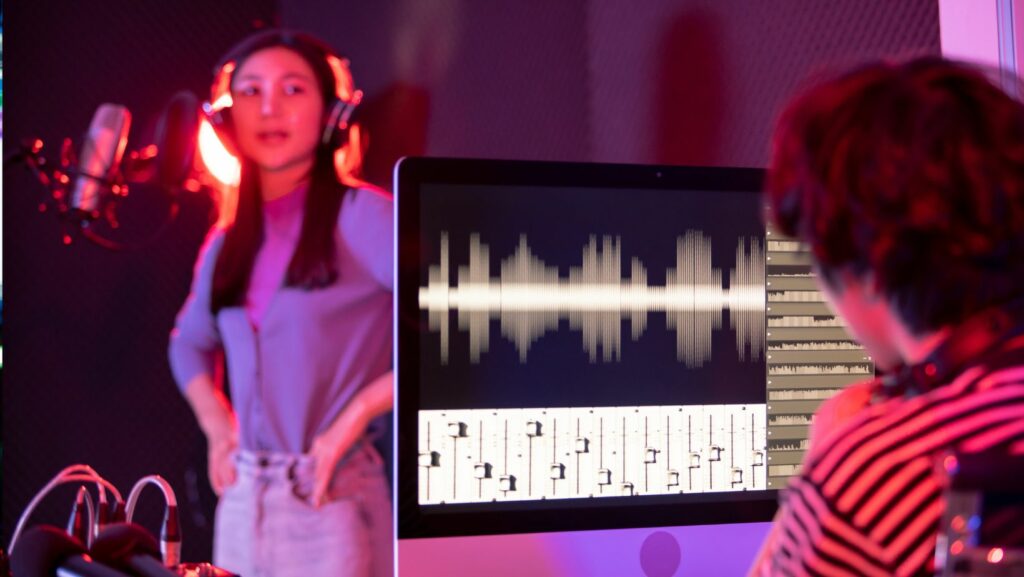The ever-evolving world of music, production and sound engineering are key to crafting captivating sonic experiences. These intertwined fields transform raw musical ideas into polished masterpieces, blending creativity with technical expertise. As digital technology advances, the boundaries of music production expand, offering endless opportunities for innovation.
Music Production And Sound Engineering

Music producers and sound engineers play crucial roles in shaping the final sound of a track. Producers focus on the artistic vision and arrangement, guiding artists to achieve the desired sound. They select genres, structure tracks, and collaborate with musicians to bring the artistic vision to life. In contrast, sound engineers manage the technical aspects of recording and audio manipulation. They set up microphones, operate mixing consoles, and utilize audio software to ensure clarity and balance, faithfully representing the producer’s vision.
Both roles require proficiency with digital audio workstations (DAWs) like Pro Tools, Logic Pro, and Ableton Live, which offer comprehensive tools for editing and mixing. Knowledge of music theory, signal flow, and acoustics enhances their capabilities, resulting in a seamless production process. The collaboration of producers and engineers includes specialized roles such as mix engineers, who balance track levels, and mastering engineers, who finalize audio for distribution. Together, they create diverse audio projects, from albums to film scores.
Key Elements of Music Production
Music production combines creativity and technical expertise to craft compelling tracks. The process involves several critical elements:

- Songwriting and Composition: Creating melodies and structures, with songwriters developing lyrics and chord progressions.
- Arranging: Structuring different musical elements to enhance dynamics and emotional impact.
- Recording: Capturing performances using microphones and DAWs, ensuring clarity and precision.
- Sound Design: Manipulating audio to create unique sounds using synthesizers and audio effects.
- Editing: Refining recorded audio by adjusting timing, correcting pitch, and eliminating noise.
- Mixing: Balancing individual audio elements to achieve clarity and cohesion.
- Mastering: Preparing the final track for distribution, optimizing audio for various playback formats.
Mastering these elements facilitates a polished production workflow, allowing producers to resonate with audiences while maintaining technical integrity.
Essential Tools and Software

Music producers and sound engineers rely on various tools and software for audio projects. DAWs form the backbone of music production, offering features for recording, editing, and mixing. Popular DAWs include Ableton Live, Logic Pro, and Pro Tools, catering to different user preferences.
Audio plugins enhance DAW capabilities, providing essential effects and virtual instruments, such as equalizers, compressors, and synthesizers. Microphones are critical for high-quality recordings, with condenser microphones preferred for studio vocals and dynamic microphones suited for live performances. Monitoring systems, including studio monitors and headphones, ensure accurate sound reproduction, crucial for mixing and mastering.
Audio interfaces connect computers with other audio equipment, converting analog signals to digital. MIDI controllers enhance creativity, allowing tactile control over DAWs and plugins, ranging from simple keyboards to complex systems.
The Role of a Sound Engineer

Sound engineers are vital in shaping audio quality during music production. They handle recording and amplification, positioning microphones, managing mixing boards, and operating recording equipment. Maintaining clarity and balance ensures the artist’s vision translates into the final product. Mixing engineers combine individual tracks into a cohesive whole, while mastering engineers prepare the final mix for distribution.
Sound engineers work in various environments, including studios and live performances, adapting to different acoustics to maintain optimal sound quality. Proficiency in DAWs and continuous learning to keep up with technological advances are essential for success in this role.
Industry Trends and Innovations

Music production and sound engineering are continuously evolving due to technological advancements. Artificial intelligence (AI) introduces automation into tasks like mixing and sound design, allowing more focus on creativity. Virtual and augmented reality create immersive audio experiences, enabling artists to engage with audiences in new ways.
High-resolution audio formats and spatial audio enhance sound quality, while cloud-based collaboration tools streamline workflows across distances. Sustainability trends also impact the industry, with eco-friendly practices gaining traction in production facilities.
Career Opportunities and Challenges
Music production and sound engineering present a dynamic landscape filled with opportunities for audio enthusiasts. As technology evolves, roles within these fields adapt, requiring professionals to stay ahead of trends and continuously hone their skills. Embracing AI and virtual reality can unlock new career paths and contribute to groundbreaking projects. With the industry’s growth, there is a rising demand for skilled individuals ready to push the boundaries of sound.

